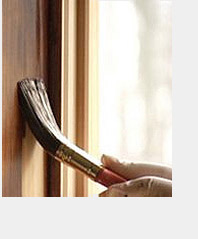News
| Reflection heat insulation coating overview |
| Reflection heat insulation coating is composed of base material, heat reflection pigment, filler and auxiliary agent. Heat insulation is achieved by reflecting sunlight efficiently. Thin layer thermal insulation reflective coating is the representative of this kind of coating. The national standard for reflective and thermal insulation coatings (JC / t1040-2007) requires that the solar reflectance shall not be less than 85% and the hemispherical emissivity shall not be less than 83%. Reflective thermal insulation coating is a new type of cooling coating integrating reflection, radiation and hollow bead thermal insulation. The coating can highly reflect the infrared and ultraviolet rays of the sun in the range of 400nm-2500nm, prevent the sun's heat from accumulating on the surface of the object, and automatically radiate the heat from the surface of the object to the space, Reduce the temperature of the object, even in cloudy days and at night, the coating can radiate heat to reduce the temperature, At the same time, a hollow bead with a very low thermal conductivity is placed in the coating to insulate the heat transfer, which can insulate the external heat to conduct to the internal of the object even when the atmospheric temperature is very high. The three major functions ensure that the temperature of the painted object is reduced and the internal space of the object can maintain a permanent and constant temperature state. When the sun is strong, the coating can reduce the surface temperature of the object by more than 20 ??, and it can reduce the temperature by more than 3 ?? or the same as the atmospheric temperature in cloudy days and nights. The coating has a good waterproof and anti leakage effect on the objects with small cracks. There are many colors of the coating to choose from. The coating can be painted with different colors at room temperature according to the requirements of different colors. In addition, the coating is smooth and flat after painting, with good hydrophobicity and self-cleaning performance. The normal temperature cooling coating is efficient cooling, thin layer, decoration, self-cleaning, waterproof, moisture-proof and UV proof A new type of low temperature, energy saving and long life coating with aging, acid and alkali resistance and corrosion resistance. Room temperature cooling coating can be widely used in construction, chemical industry, petroleum, electric power, metallurgy, shipping, light textile, storage, transportation, aerospace and other industries to reduce temperature, save energy, and create a comfortable living and working environment for human beings. 1. The thermal performance of reflective heat insulation coating is better than that of other heat insulation materials. 2. Reflective thermal insulation coatings can be applied to places with limited volume and weight. (approved) 1mm thick reflective thermal insulation coatings reflect all thermal radiation of about 90%-95%, equivalent to 10mm thick R value of 20 polystyrene foam. 3. The reflective heat insulation coating has the excellent functions of moisture-proof and water-proof steam, which can block the condensation of water vapor and prevent the oxidation of the surface of the insulator (such as steel pipe, boiler, etc.). It is also important that its heat insulation performance will not decline when contacting the humid environment. To achieve high thermal reflectance, pigments with high refractive index must be selected, but the color has a great influence on the thermal reflectance. Generally, with the decrease of brightness, the thermal reflectance decreases. Therefore, it is easy to choose white or light color as the color of reflective heat insulation coating, or use spectral selective materials to match a certain color. Although the thermal conductivity of thin-layer reflective insulation coating is not high, due to the thin film thickness, the total thermal resistance is limited, and the insulation effect is not very good. This can be clearly illustrated by the calculation of the heat transfer coefficient K in the following example. Reflective thermal insulation coating has been used in offshore drilling platform, oil tank, oil pipeline, steel structure roof of construction industry, etc., to reduce the surface temperature and internal temperature of equipment exposed to solar heat radiation, improve the working environment, improve safety, etc. Reflective insulation coating can be used alone or in combination with other porous insulation materials. For example, it can be used as a supporting material for external wall insulation, especially in hot summer and cold winter, hot summer and warm winter areas, forming a high reflection and low heat transfer structure, achieving the effect of both heat insulation and heat preservation. Thermal insulation coating is a kind of coating that realizes heat insulation and heat preservation through low thermal conductivity and high thermal resistance. At present, reflective heat insulation coating is mainly used for the heat insulation of casting mould, oil tank and pipeline, but it can not be used for the external insulation of the external wall. It is expected to be used for the external insulation system of the external wall through modification in the future. The combination of thermal insulation coating and external wall insulation can well meet the requirements of external wall insulation and insulation in hot summer and cold winter and hot summer and warm winter areas. It is a good choice to use reflective heat insulation coating to improve the heat insulation performance with low thermal conductivity and high reflectivity. [ Previous] [Next] [Return] |







